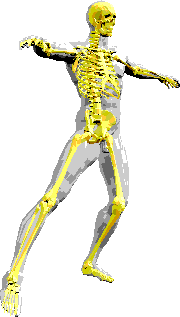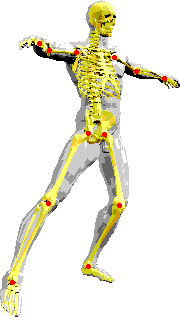Life Drawing
Lesson I
Gesture -- The Foundation of Figurative Art

Pivot Points

The bones articulate with each other within joint
capsules. There are imaginary centers of movement inside the joints. I call
these locations pivot points.
It is very easy to imagine the locations of pivot points in
joints. In fact, it is much easier to think about pivot points than trying
to decipher and draw the external view around the joints.
Because it's so easy to locate pivot points, I strongly recommend
that you think pivot points right after you apply the three ovals.
A few more important thoughts on pivot points:
As the illustration below shows, pivot points are located
deep inside the body parts. They are not associated with the exterior contour
of the body. Pivot points can be expertly imagined even in body parts not
visible to the artist. This can provide enormous assistance when you want
to organize a confusing gesture pose.


Gesture Intro Page  Skeletal
Foundation
Skeletal
Foundation 
Stick: The following
are the key elements for organizing a "stick" figure:
The line of action  Three
ovals -- Head, Ribcage, Pelvis
Three
ovals -- Head, Ribcage, Pelvis  Pivot
points
Pivot
points  Long bones
Long bones
 Tilts and angles
Tilts and angles  Contour
center lines of front and back torso, and face
Contour
center lines of front and back torso, and face 
Projection
and volume augmentations: While good as a foundation, the stick
figure does not adequately express projection of form, volume, or relative
position in space. There is more you can do to express these important factors
in the posing model:
The shortcomings of the stick figure  Showing projection
Showing projection  Application
of the projection concept to the stick figure
Application
of the projection concept to the stick figure  Simple
volume solutions
Simple
volume solutions  Relative
position in space
Relative
position in space 
Loosen up:
Using the stick figure foundation with the projection and volume augmentations,
you can loosely organize an expressive gesture sketch:
Compare the "contour" method to the
stick-start method  Importance
of the free-going mark
Importance
of the free-going mark  The line of
action and stick are construction lines
The line of
action and stick are construction lines  Adding
relationship and rhythm
Adding
relationship and rhythm
What's New? | Shortcut
Entrances: | Studio
| Alzofon Art Institute | Guest
Wing, Link Room | Idea
Library | Academy |
Rebecca Alzofon
can be e-mailed at rebecca@art.net
This page created February 14, 1998
 1998 by Rebecca Alzofon. All rights
reserved.
1998 by Rebecca Alzofon. All rights
reserved.
